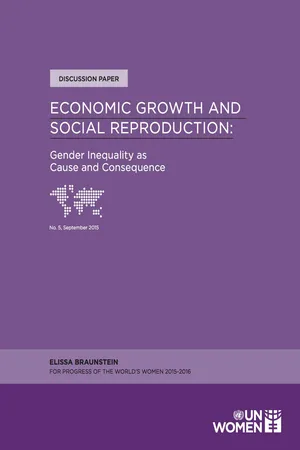
eBook - PDF
Economic Growth and Social Reproduction
Gender Inequality as Cause and Consequence
United Nations Women
This is a test
- 50 pages
- English
- PDF
- Available on iOS & Android
eBook - PDF
Economic Growth and Social Reproduction
Gender Inequality as Cause and Consequence
United Nations Women
Book details
Table of contents
Citations
About This Book
This work develops a set of regimes that link structures of economic growth with those of social reproduction. These regimes are then linked to groups of countries organized by economic structure and level of development to evaluate the macroeconomic consequences of a decline in gender inequality in the labour market. Social reproduction is defined in terms of the time and money it takes to produce, maintain and invest in the labour force, so it includes both paid and unpaid care work. The analytical emphasis is on how the distributions of production and reproduction among women, men, the state and capital determine investment and growth and how gender inequality is both cause and consequence of these relationships.
Frequently asked questions
How do I cancel my subscription?
Can/how do I download books?
At the moment all of our mobile-responsive ePub books are available to download via the app. Most of our PDFs are also available to download and we're working on making the final remaining ones downloadable now. Learn more here.
What is the difference between the pricing plans?
Both plans give you full access to the library and all of Perlego’s features. The only differences are the price and subscription period: With the annual plan you’ll save around 30% compared to 12 months on the monthly plan.
What is Perlego?
We are an online textbook subscription service, where you can get access to an entire online library for less than the price of a single book per month. With over 1 million books across 1000+ topics, we’ve got you covered! Learn more here.
Do you support text-to-speech?
Look out for the read-aloud symbol on your next book to see if you can listen to it. The read-aloud tool reads text aloud for you, highlighting the text as it is being read. You can pause it, speed it up and slow it down. Learn more here.
Is Economic Growth and Social Reproduction an online PDF/ePUB?
Yes, you can access Economic Growth and Social Reproduction by United Nations Women in PDF and/or ePUB format, as well as other popular books in Politics & International Relations & Intergovernmental Organizations. We have over one million books available in our catalogue for you to explore.
Information
Table of contents
- Table of contents
- 1. Introduction
- 2. A macroeconomic framework for social reproduction
- 3. Economic structure, social reproduction and growth
- 4. The rise of the social investment state
- 5. Conclusion
- References
Citation styles for Economic Growth and Social Reproduction
APA 6 Citation
Women, U. N. (2015). Economic Growth and Social Reproduction ([edition unavailable]). United Nations. Retrieved from https://www.perlego.com/book/3275282/economic-growth-and-social-reproduction-gender-inequality-as-cause-and-consequence-pdf (Original work published 2015)
Chicago Citation
Women, United Nations. (2015) 2015. Economic Growth and Social Reproduction. [Edition unavailable]. United Nations. https://www.perlego.com/book/3275282/economic-growth-and-social-reproduction-gender-inequality-as-cause-and-consequence-pdf.
Harvard Citation
Women, U. N. (2015) Economic Growth and Social Reproduction. [edition unavailable]. United Nations. Available at: https://www.perlego.com/book/3275282/economic-growth-and-social-reproduction-gender-inequality-as-cause-and-consequence-pdf (Accessed: 15 October 2022).
MLA 7 Citation
Women, United Nations. Economic Growth and Social Reproduction. [edition unavailable]. United Nations, 2015. Web. 15 Oct. 2022.